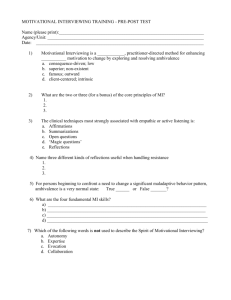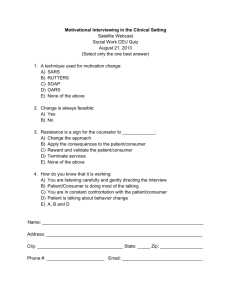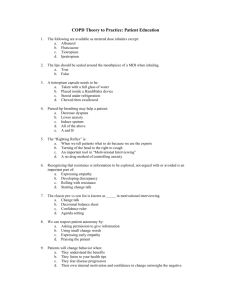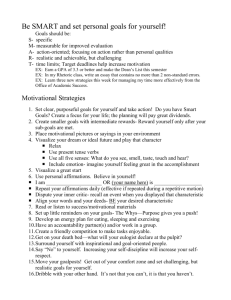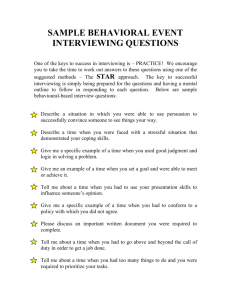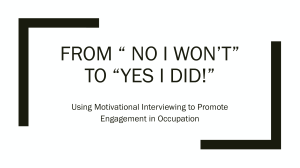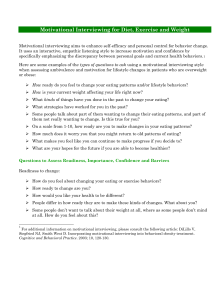Motivational Intervi..
advertisement
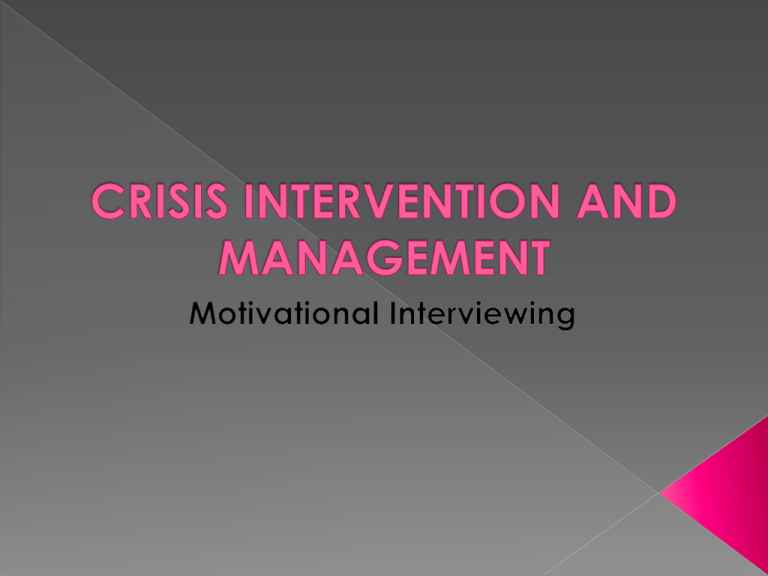
1. Define motivational interviewing. 2. Identify what is ‘change talk’. 3. Explain basic motivational interviewing principles. 4. Discuss the opening strategies for motivational interviewing. 2 DEFINITION Motivational interviewing is a treatment intervention based on principles from humanistic psychology. It is: • Client-Centered • Directive • It seeks to increase internal motivation for change through resolution of ambivalence and an increase in perceived self-efficacy 3 Motivational Interviewing is not impartial. The goal is to move the client in the direction of making a positive change. 4 5 The opposite of “sustain-talk” is “change-talk”. The more a client makes arguments for change the stronger the commitment. Another goal of Motivational Interviewing is to encourage as much change talk as is possible and to explore and expand on it. 6 MI uses an acronym to identify types of “change-talk” identified by Amrhein and Miller (Amrhein et al, 2003). The acronym is DARN-C and it stands for: Desire: Want, wish, like Ability: Can, could, able Reasons: Specific reason for change Need: Need to, have to, must, important, etc. Commitment: Will, intend to, going to, etc. 7 “I really want to be a good room mate and I know I should make some changes.” “I quit smoking when I decided I was ready and I think I can do this too.” “I know I would be more motivated and do better in school if I cut down on my drinking.” “I really need to stop using or I think my boyfriend will leave me.” “I feel ready to make this change and I know it will be difficult, but I have a good plan.” 8 Express empathy Roll with resistance Develop discrepancy Support self-efficacy Avoid argumentation 9 10 11 12 13 14 Open-ended Questions Affirmations Reflections Summaries 15 Open-ended Questions: Open-ended questions are questions that you cannot comfortably answer with a yes/no/maybe answer. An example of a close-ended question (one that can be answered yes/no/maybe) is, “Have you had anything to drink today?” An example of an open-ended question is, “What is a typical drinking day like for you?” 16 Affirmations An affirmation identifies something positive about the client and gives credit or acknowledgement. It may be a trait, behaviour, feeling or past or present accomplishment. 17 Reflections Reflections are statements made to the client reflecting or mirroring back to them the content, process or emotion in their communication. When using MI the worker wants the majority of their communication to be in the form of reflections and not questions. 18 Summaries Summaries can be used to make a transition in a session, to end a session, to bring together content in a single theme, or just to review what the client has said. 19 Narration by A. Lewinson-Morgan Voices: Micah Garci and Aura Prescod Images courtesy of eLearning Brothers and Sagdejev at Wikimedia Commons 2016 UWI Open Campus 20
